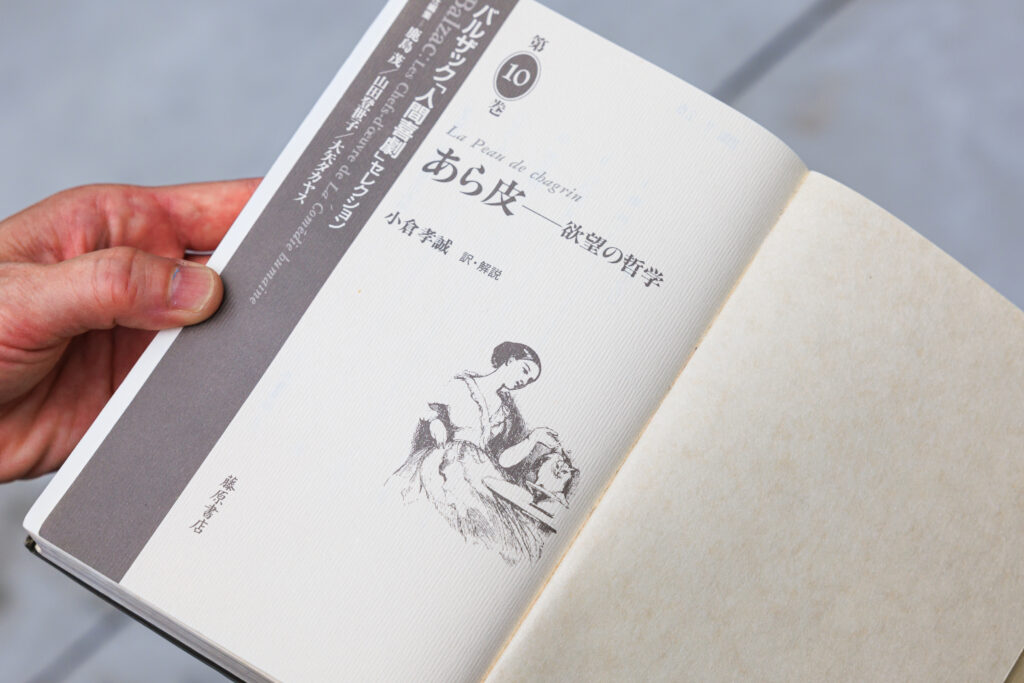
Professor Kaoru Hakata of the Faculty of Humanities researches the works of Balzac, the 19th century French author. In an era when reading was becoming popular hobby and leisure activity among the general populace, Balzac penned more than a hundred works. What is the appeal of his outstanding genius?
Honoré de Balzac was a French author in the 19th century. I first started to study his works when I visited Prades in the south of France in my third year at university. I happened to stop in at a bookstore, where I got hold of a copy of his La Peau de chagrin (The Wild Ass’s Skin). The author’s vivid depiction of the ambition and fear of the main character, at the mercy of the ass’s skin that grants his wishes in return for shortening his life, had a major impact on me. I realized this was a man who could write impressive novels, so when I got back to Japan, I read his works from beginning to end.
Debts are shouldered by his mother: some episodes are scandalizing

The first half of the 19th century, when Balzac was active, was a time of great change in French history, with the coronation of Napoleon as emperor and the restoration of the Bourbon monarchy. The later July Monarchy saw the rise of the bourgeoisie who had gained wealth through commerce and industry. This was a time when reading, hitherto a culture and pleasure of the nobility, also became widespread among the general public. This is also the time when newspaper publishers, eager to gain readers, started serializing novels, and Balzac was the first author to write a newspaper serial novel.
For me, in short, Balzac was a genius who defied conventions and accepted norms. He failed at a number of businesses even after first starting to write, landing him in debt. He got his mother and his lover to take on this debt in his place, and, from his love of show and aspirations towards the upper classes, changed his name to add a nobiliary particle. There are several quite scandalizing episodes in his life like this. The genius that led him to pen more than a hundred novels during his lifetime, the expressiveness seen through the living lines of his works, the efforts he made to protect the rights of authors, the energy to found a society of writers and artists. In an era when gorgeously-bound books were preferred, he attempted to create pocket editions that were easy to carry, showing that he also had a lot of foresight. It is this genius, and the gap between his lifestyle so unconnected with smartness, that may be Balzac’s appeal.
Untangle the meaning of words, breathe life into an old classic
Balzac’s novels do not just contain their author’s own opinions and words, but also the debates, popular topics, and rumors of their era. Balzac’s novels were written within the context of the 19th century, and for us to understand the texts from a three-dimensional perspective, we need to look into the social conditions, lifestyles, culture, and trends of the time. Reading a book as closely as this will let you grasp the meaning of the text from multiple angles, deepening the emotions you get.
For example, I recently looked into the language of flowers used in the 19th century. The language of flowers might suggest something short, like “eternal love,” but when I examined 19th century materials stored in the French national library, they showed that before the Revolution, the combinations of color of the flowers or how the ribbon holding them together was tied would allow the upper class to make some quite complex statements. If you understand this, then from a sentence like “I made a bouquet of xxx and yyy flowers, tied with a zzz bow, and sent it to my lover” you can infer the hidden message, perhaps an expression of feeling that cannot be said face to face, or letting the lover know that their feelings have changed, or any dozen of other interpretations.
No matter how famous the work, its contents, its words, age over time. To untangle the author’s words, replace them with today’s words and make them available to the world is to breathe new life into an old work. To me, this is one of the meanings of studying literature, and one of its roles.
The book I recommend
“La Peau de chagrin”(The Wild Ass’s Skin)
by Honoré de Balzac, Japanese translation by Kosei Ogura, Fujiwara-Shoten)

The first work in the “La Comédie Humaine” series, which Balzac spent his life working on. This novel presents the philosophy of life of Balzac, who delved deeply into real society, but also searched for the mystical, and was my starting-point as a researcher.
-
Kaoru Hakata
- Professor
Department of French Literature
Faculty of Humanities
- Professor
-
After receiving a B.A in French Language and Literature from the Faculty of Letters, The University of Tokyo, completed doctoral studies at the Université Paris VII and the Graduate School of Humanities and Sociology, The University of Tokyo to receive a Ph.D. in Literature. After working as a lecturer at Kwansei Gakuin University then an associate Professor at the Tokyo University of Foreign Studies, appointed to her current post in 2018.
- Department of French Literature
Interviewed: July 2022